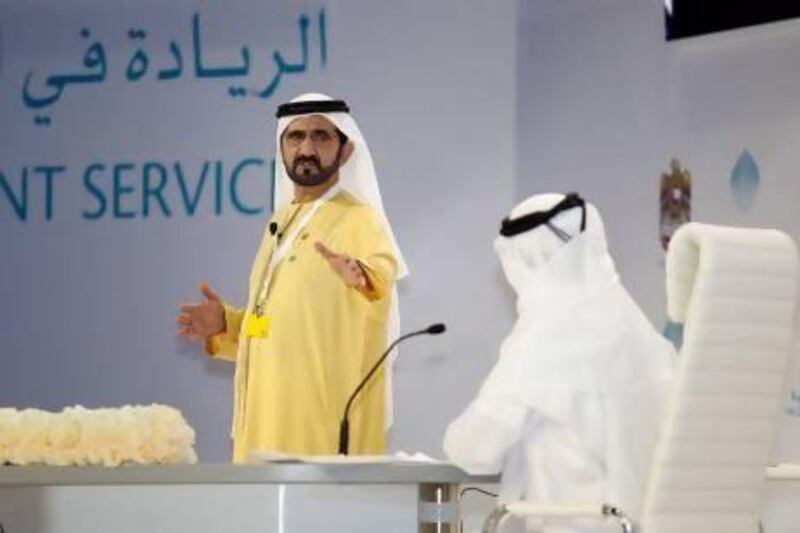DUBAI // Sheikh Mohammed bin Rashid opened a groundbreaking summit on governance today by stressing the importance of service to the community and striving for excellence.
"We want the world to benefit from our experience as we aim to become one of the world's best governments," he told 2,500 officials and foreign dignitaries at the two-day Government Summit in Dubai. "Our aim is to guarantee prosperity for our people, create jobs and open new doors for opportunity."
In a two-and-a-half-hour speech and question-and-answer session, Sheikh Mohammed, the Prime Minister and Ruler of Dubai, outlined his plans for improving government services, guaranteeing the prosperity of the UAE and recognising the changing dynamics of the region and the world.
His aspiration, he said, was for his nation to be "number one" because of his desire and ambition for all Emiratis to share this vision.
"Becoming number one is not impossible – the word impossible doesn't exist in our dictionary," he said.
"Authority is to serve the people, not control them. Our forefathers wanted to improve the quality of life for us."
Sheikh Mohammed said the priorities of Sheikh Khalifa, the President, were "the Emirati citizen first, second and third. I am confident of our ability to be the best government globally as per our Vision 2021."
The Prime Minister responded to more than 30 questions from citizens, residents and journalists at a session in which he shared his future plans, private thoughts and vision for the nation.
He said the Government's objective was to make its citizens happy. "To raise the happiness level of the citizens you have to provide them with adequate education, health care, rule of law and great government services," he said.
Sheikh Mohammed said the future of the UAE was best summed up in three words: enabling, educating and Emiratisation.
The future of government services was for any citizen to be able to complete any government transaction through a handheld device.
"I want the Government to be like hotels offering hospitality and like airlines operating 24 hours," he said. "Our role is not govern to rule the people but govern to serve the people."
Employees should be given more powers to develop, he said. "Give them the power and right to work, show them they are capable. Provide awards for the hard workers, and show them what competition is like. They will then be passionate, they will want to do more and others will surely follow."
Sheikh Mohammed said that what had happened during the Arab Spring had been inevitable. "In 2004 I held a lecture at the Gulf University in Bahrain where I warned Arab leaders that they should change their ways otherwise they risk being changed. I did not predict the future but all the indicators showed that.
"I do not want to judge the previous Arab rulers or the current ones, all I hope for is that the Arab world and Arab countries prosper."
Sheikh Mohammed also stressed the role of Emirati women. "Everyone plays a role in society. Seventy per cent of graduates are women, 65 per cent of women are part of the government, and 30 per cent are leaders already.
"Women work hard and achieve more, they have a brighter future. We have plans for women, and the men should watch out, for the women will take their positions."
He also responded to claims that the UAE had gained economically from the Arab Spring. "The UAE did not gain economically from the Arab Spring and the answer is in the proof," he said.
"Our top ten countries strategically do not include a single Arab country where we have our highest income, it is true Dh30 billion came in from Arab Spring countries but the UAE has spent two or three times this amount in them before the unrest, and would spend even more now if the situation were stable," he said.
Speaking about dealing with risk, he said: "Every project is risky.Should we stop?
"Life's steps are filled with challenges, without them we will be lazy. How will we strengthen the economy if we stop? The challenges will always be there, but if you have a goal you will know how to get to it."
amustafa@thenational.ae
aalkhoori@thenational.ae






